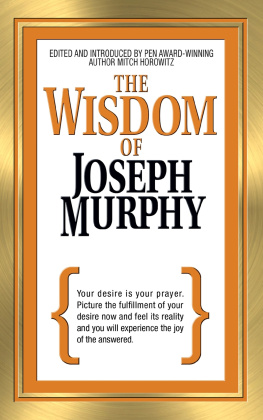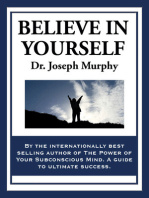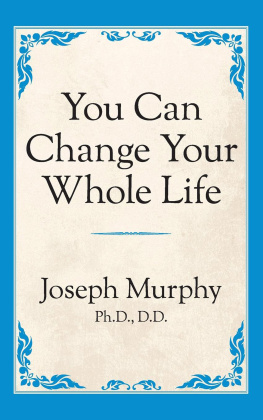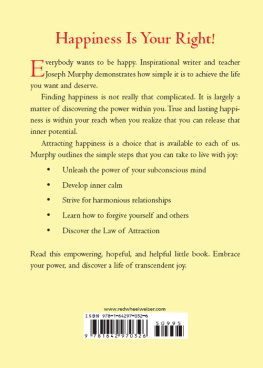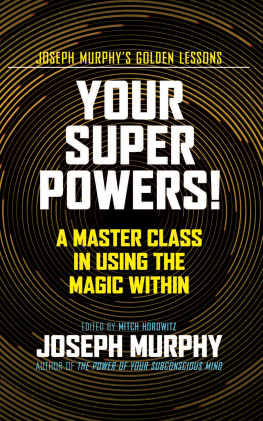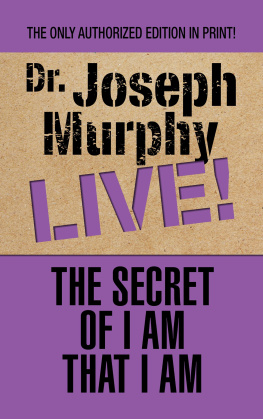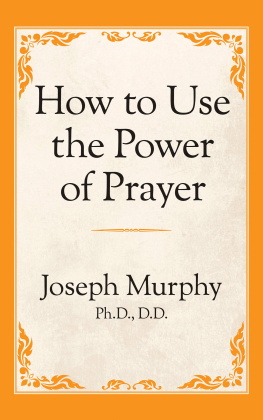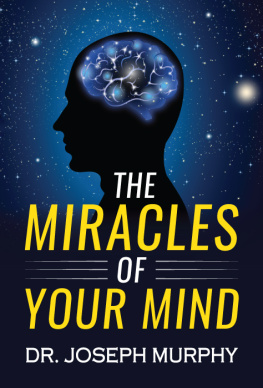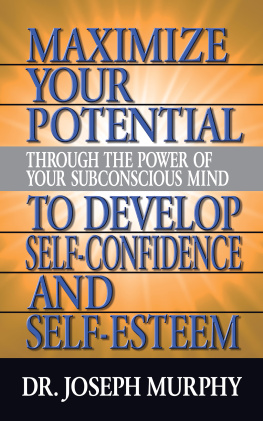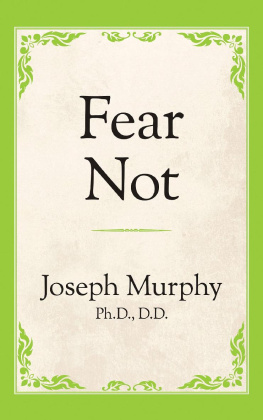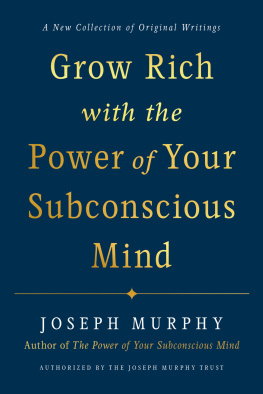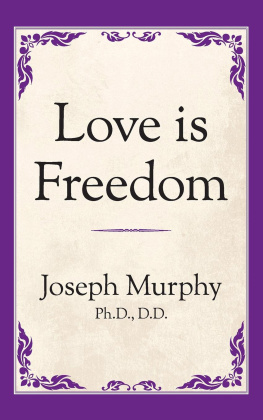Dr. Joseph Murphy (editor) - The Wisdom of Joseph Murphy
Here you can read online Dr. Joseph Murphy (editor) - The Wisdom of Joseph Murphy full text of the book (entire story) in english for free. Download pdf and epub, get meaning, cover and reviews about this ebook. year: 2020, publisher: G&D Media, genre: Religion. Description of the work, (preface) as well as reviews are available. Best literature library LitArk.com created for fans of good reading and offers a wide selection of genres:
Romance novel
Science fiction
Adventure
Detective
Science
History
Home and family
Prose
Art
Politics
Computer
Non-fiction
Religion
Business
Children
Humor
Choose a favorite category and find really read worthwhile books. Enjoy immersion in the world of imagination, feel the emotions of the characters or learn something new for yourself, make an fascinating discovery.
- Book:The Wisdom of Joseph Murphy
- Author:
- Publisher:G&D Media
- Genre:
- Year:2020
- Rating:3 / 5
- Favourites:Add to favourites
- Your mark:
- 60
- 1
- 2
- 3
- 4
- 5
The Wisdom of Joseph Murphy: summary, description and annotation
We offer to read an annotation, description, summary or preface (depends on what the author of the book "The Wisdom of Joseph Murphy" wrote himself). If you haven't found the necessary information about the book — write in the comments, we will try to find it.
The Wisdom of Joseph Murphy — read online for free the complete book (whole text) full work
Below is the text of the book, divided by pages. System saving the place of the last page read, allows you to conveniently read the book "The Wisdom of Joseph Murphy" online for free, without having to search again every time where you left off. Put a bookmark, and you can go to the page where you finished reading at any time.
Font size:
Interval:
Bookmark:

THE
WISDOM OF
JOSEPH
MURPHY
All titles in this series
The Wisdom of James Allen
The Wisdom of Joseph Murphy
The Wisdom of Napoleon Hill
The Wisdom of Robert Collier
The Wisdom of Wallace D. Wattles
THE
WISDOM OF
JOSEPH
MURPHY
edited and introduced
by Mitch Horowitz


Published 2020 by Gildan Media LLC
aka G&D Media
www.GandDmedia.com
THE WISDOM OF JOSEPH MURPHY. Introduction, Chapter Notes, Timeline and Afterword, copyright 2020 by Mitch Horowitz
No part of this book may be used, reproduced or transmitted in any manner whatsoever, by any means (electronic, photocopying, recording, or otherwise), without the prior written permission of the author, except in the case of brief quotations embodied in critical articles and reviews. No liability is assumed with respect to the use of the information contained within. Although every precaution has been taken, the author and publisher assume no liability for errors or omissions. Neither is any liability assumed for damages resulting from the use of the information contained herein.
Front Cover design by David Rheinhardt of Pyrographx
Interior design by Meghan Day Healey of Story Horse, LLC
Library of Congress Cataloging-in-Publication Data is available upon request
ISBN: 978-1-7225-0150-1
eISBN: 978-1-7225-2249-0
10 9 8 7 6 5 4 3 2 1
Contents

by Mitch Horowitz
I
This Is It: The Art of Metaphysical Demonstration
II
Fear Not
III
The Meaning of Reincarnation
IV
Believe In Yourself
V
Stay Young Forever
VI
Nuclear Religion
VII
Why Did This Happen to Me?
You Are As Your Mind Is
INTRODUCTION BY MITCH HOROWITZ
M any of us grew up with the notionalmost wholly untestedthat our moods are, more or the less, the result of our circumstances. That our moods are symptoms.
Metaphysical writer and minister Joseph Murphy (18981981) upended that point of view. Murphy perceived and documented a different and more powerful way of livingone in which mood, thought, and mental image are causes rather than symptoms. Murphy considered this true in the most literal and vital sense. More so, the author reasoned that you, as an individual, are an expression and channel of the Godlike creative powers referenced in Scripture, and that you are, at this very moment, constructing your world through your emotionalized thoughts and mental images.
Beginning with his first book This Is It in 1945, the Irish minister combined principles of psychology, self-suggestion, and a cosmological theology, which he had been developing and testing for many years. It is notable that Murphy did not produce his first book until age forty-sevenhe first sought to validate his ideas in the laboratory of experience. Once Murphy found his footing as a writer and speaker, his output was prodigious, as you can see from the timeline at the end of this book.
The size of Murphys readership, which today is growing, is equal to the volume of his output. Part of the reason for Murphys posterity is that he dramatically and, for many people, convincingly married twentieth-century psychology with the New Metaphysics, specifically New Thought, Science of Mind, Unity, Christian Science, and Divine Science. In so doing, he gave readers a dramatic new sense of their self-potential and their role in creation.
Murphy accepted the traditional premise that we all possess two minds: the outer, rational mind, called the conscious; and the inner, emotional mind, called the subconscious, or what is sometimes called the psyche. The subconscious is generally agreed to be the driving engine of your lifeit is the hidden influence that shapes and reinforces your attitudes, affinities, perceptions, self-image, relationships, and experiences. But Murphy went further. He reasoned that the subconscious mind is programed by the conscious mind: what we view and accept as valid or perceptively justifiedwhether or not this is sound or desirableis acted upon and out-pictured by the subconscious in a complex of ways.
Hence, Murphy reasoned that the mission of the conscious mind must be to protect the subconscious from receiving impressions that misdirect its life-shaping energies. We must consciously filter out or temper suggestions that we do not want the psyche to uncritically accept and act upon. The stakes of this transaction are higher than is commonly understood. The subconscious, Murphy reasoned, mediates between individual experience and the existence of an Infinite Mind, which courses through each of us like the inlets of a vast ocean. Seen another way, the subconscious or psyche is the medium through which Infinite Mind, or what Scripture calls God, creates and actualizes.
This view is largely at home in New Thought. It differs somewhat from Christian Science insofar as Christian Science theology sees the human mind itself not as a mediator between the individual and higher but as an illusionsometimes called mortal or material mind, which must be allowed to dissolve like a fog of delusion so that the one Higher Mind can shine through. In effect, however, Murphys philosophy agrees with Christian Science and the related metaphysical schools: materialism is ultimately a delusion and the one true reality is the fullness and unsurpassed peace of the Higher Mind. In this sense, Murphy endeavored to harmonize the New Metaphysics, biblical revelation, religious symbolism, and modern psychology.
Murphy was a lifelong seeker and traveller, in both inner and outer realms. As such, he was well suited to the task he took on.
Born in 1898 on the southern coast of Ireland, he grew up in a large, devout Catholic family. Murphys parents urged him to join the priesthood. But the young seminarian found religious doctrine and catechism too limiting. Eager to peer more deeply into the internal mechanics of life, the he left seminary to dedicate his energies to chemistry, which he studied both before and after his religious training.
In the early 1920s, married yet still searching for his place in the world of career and commerce, Murphy relocated to America to seek employment as a chemist and druggist. After running a pharmacy counter at New Yorks Algonquin Hotel, Murphy renewed his study of mystical and metaphysical ideas. He read the works of Taoism, Confucianism, Transcendentalism, Buddhism, Scriptureand New Thought. The seeker grew fully enamored with the New Metaphysics sweeping the Western world. The causative power of thought, Murphy came to believe, revealed the authentic meaning of the worlds religions, the deeper meaning of psychology, and the eternal laws of life.
In arriving at his matured spiritual outlook, Murphy told an interviewer that he studied in the 1930s with the same teacher who tutored his contemporary New Yorker and friend, mystic Neville Goddard (19051972). Murphy said they shared the same mentor: a turbaned man of black-Jewish descent named Abdullah. Shortly before his death in 1981, Murphy, in a little-known series of interviews published in French by a Quebec press, described his encounter with the mysterious Abdullah. Interviewer Bernard Cantin recounted the tale in his 1987 dialogues with the writer:
It was in New York that Joseph Murphy also met the professor Abdullah, a Jewish man of black ancestry, a native of Israel, who knew, in every detail, all the symbolism of each of the verses of the Old and the New Testaments. This meeting was one of the most significant in Dr. Murphys spiritual evolution. In fact, Abdullah, who had never seen nor known the Murphy family, said flatly that Murphy came from a family of six children, and not five, as Murphy himself had believed. Later on, Murphy, intrigued, questioned his mother and learned that, indeed, he had had another brother who had died a few hours after his birth, and was never spoken of again
Next pageFont size:
Interval:
Bookmark:
Similar books «The Wisdom of Joseph Murphy»
Look at similar books to The Wisdom of Joseph Murphy. We have selected literature similar in name and meaning in the hope of providing readers with more options to find new, interesting, not yet read works.
Discussion, reviews of the book The Wisdom of Joseph Murphy and just readers' own opinions. Leave your comments, write what you think about the work, its meaning or the main characters. Specify what exactly you liked and what you didn't like, and why you think so.

